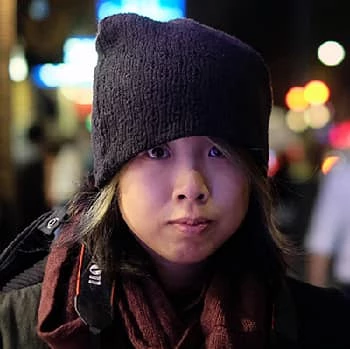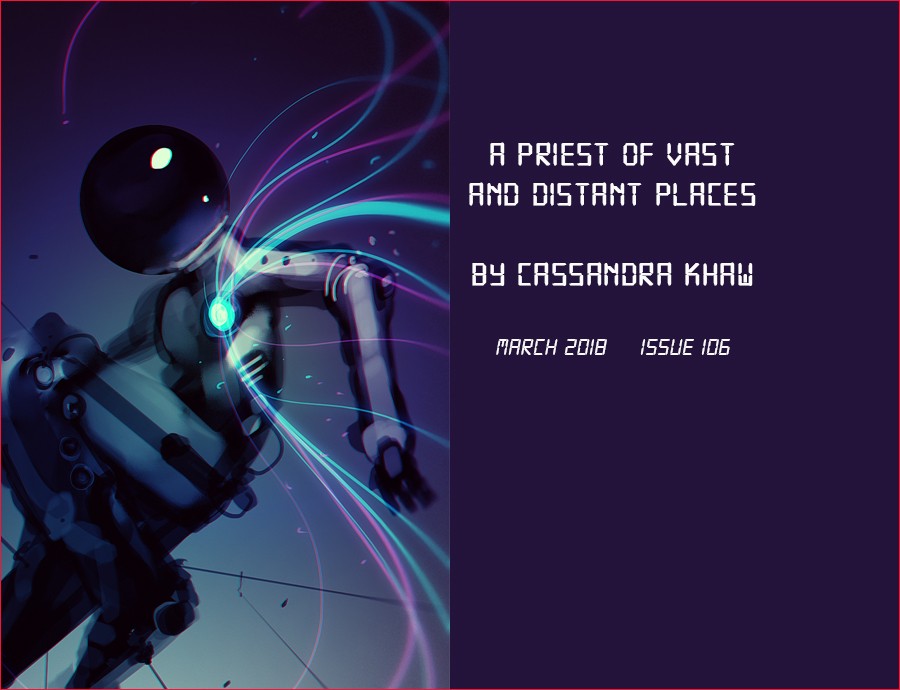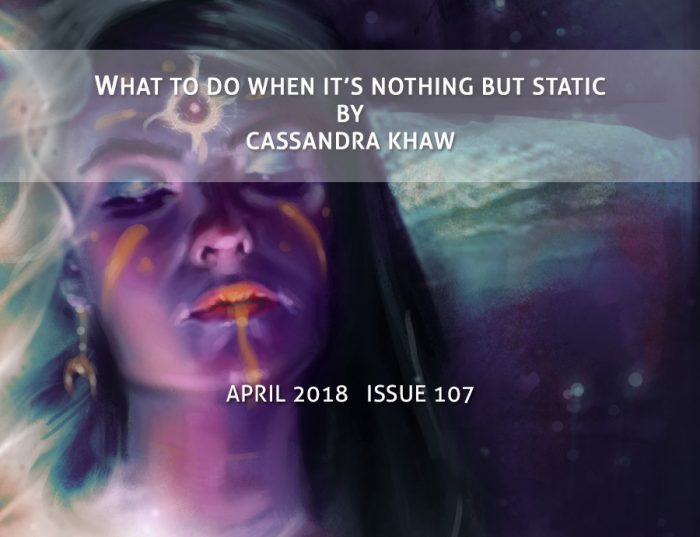
Be careful with trusting navigation systems. Sometimes they lie. They say there is a place where world ships go when they know the end is close. A prism of stars, ravenous, burning like abattoirs, striated by temporal anomalies and transcendentally sublime. If you go there, you’ll see leviathanic corpses suspended between asteroids belts, their bones polished to incandescence by solar winds and cosmic debris. But don’t get too close. Not every ship waits for its crew to evac first.
Still, if you make that mistake, all is not necessarily lost. If you’re quick enough and clever enough, if you can inject the right code, the right algorithms before the first revenants appear, chances are you’ll be fine. Ghosts, whether allegorical or discorporate victims of recursive timelines, only want space to sleep.
At least, that’s what they say.
§
“You don’t really believe there are ghosts, do you?” drawls Fatimah through a mouthful of cherry cola gum. The tips of her black hair are knife-frayed, stained cinnamon and lime.
Allen bristles. “There’s no empirical evidence—”
“There’s no empirical evidence that the sun isn’t secretly rainbow-colored either,” Fatimah retorts as she decants from her perch, an elegant motion, a gymnast’s descent. She sweeps thick hair from a sharp-boned face, eyes liquid and bored. Against her brown skin, the vintage headphones, meticulously maintained, gleam like the ferryman’s wages. “But you don’t see anyone complaining about that.”
He scowls. Fatimah grins. Were it not for the way she makes his pulse jackhammer against the membrane of his throat, the way her voice makes reason the exception, he wouldn’t tolerate her. Allen’s sure of that. Stupid crush, he thinks before Fatimah’s proximity devours all autonomy.
“You’re sweating.”
Stupid crush, he thinks again, a smile trembling on the cusp of being. “Yeah. Well. Might have something to do with the fact we’re in the incinerator room.”
Fatimah laughs and turns, the sway of her hips keeping time with the pounding of his heart, to strut up to the dormant trash compactor and pat it like a recalcitrant puppy. Allen tenses with the urge to follow, but he knows better to react before Fatimah commands, knows better than to volunteer a voice to the hungry silence.
“Since you believe in ghosts—”
“I never said—”
Fatimah laughs, a clear, silver music that cuts to his spine. “Since you believe in ghosts, I’ve got one for you. It’s about the Nu Gui …”
A pulse of recognition. “That’s cheating. Teke-teke is old world mythos.”
“No.” Fatimah disgorges a wad of chewed-up gum, affixes it to the alloyed surface. It moans a whalesong reply and Allen twitches like a man impaled on a jolt of electricity, eyes sliding away from the dark corners. If he just withholds acknowledgement, surely, he can deny them existence, those jittering, staticky things in the margins of his eyesight. “She’s not. Teke-teke isn’t just a construct of Old China. She’s a metaphysical meme.”
“This is lame, Fa—”
“They say—” A defiant interruption. Allen shivers, riveted. Fatimah’s voice is silver, is gold resin, is entrapment honeyed and resonant, irresistible as the siren lure of a black hole. “—that myths can be divided into two categories: oral and memetic. One is deathless, one is not, surviving so long as the concept remains intact.”
“That doesn’t make sense.” Allen purses his mouth. Neither adolescent lust nor fear of the unknown can counteract candor. “Oral tradition is memetic. That’s the whole point. What you’re saying is an oxymoron, and Fa—”
“You’re making it too scientific.”
“I’m making it too scientific?” Incredulity wells, hot, metallic. “You were the one teasing me about believing in ghosts and—”
“So you do believe in ghosts!”
“Argh!” Allen chucks his arms into the air, a hundred heartfelt profanities interlaced with that single expulsion of exasperation. “No! That’s not what I meant! And even if I did, it’s beside the point. Anyway. My point is you don’t have a point.”
His diatribe is received with a look and then discarded with a laugh. Fatimah tosses her hair and continues, relentless, triumphantly brazen.
“They say—” She begins again, stressing the words just so, with just enough charm to make Allen’s heart jump. “—that the Nu Gui is the vengeful spirit of a suicide who meets their end in a bloom of red—”
Allen feels eyes on the back of his hands, his mouth, his skin, and he shivers in reply to the weight of their scrutiny. “You mean they slit their wrists?”
“Ugh. You have no poetry—”
“This isn’t exactly a laughing matter. You—”
“Whatever. Anyway, like I was saying, the Nu Gui is the spirit of a woman who either committed suicide while wearing red, or was buried in red. Ordinarily, it’s a one in five billion chance that the dead will return, but something about that color pulls at them, especially those who died unfairly.”
Here, Fatimah’s eyes turn glassy, glazed, carefully pared of emotion, her mouth the dark slit of an emptied throat.
“So, what happens if you die while wearing a blue t-shirt?” Allen demands, eager to distract from whatever had hollowed her stare. Behind him, the room whispers, thickens, as though occupied by a thousand spectators. “You come back like an emo-goth?”
Fatimah shifts gears, swaps her solemnity for a vivid smile, the parabola of her mouth a star chart of secrets. “No clue. But I think it’s time we find out if Nu Gui can be non-Chinese.”
Before Allen can react, before he can devise a scream, a plea to desist, Fatimah presses a button, plunges an arm deep into the glowing maw.
Steel shrieks shut.
Crunch.
§
They say you should be careful when speaking to the neural matrices of your ancestors. Not all of them are real. They say that one in every twenty million is erroneous, a digital ego populated by serendipity; baseless, frameless, causal offspring of a thousand compromised archives.
The danger with these constructs is they are also parasitic, accidents in binary, input-starved and predatory. If you let them, they’ll slither from network to neuron to nest, quiet in the cup of your skull. There, they’ll propagate, replicate, will complicate and instigate new branches of identity in the taxonomy of your memories, eliding fact into fabrication, until there is no “me” and only “we,” a deep mind rife with maybes and never-could-bes.
There is no cure for that, they say. If they get you, you’re as good as dead so watch out and read closely. Be careful, be slick. Be always vigilant against ghosts in grandparent skins.
§
“What do you think happens to the bodies?”
Allen glances at Fatimah. The uniform makes a stranger of her silhouette, more so than the fresh absence of her right arm, the limb ending smoothly beneath the elbow. It is constrictive, her attire, black synth-leather delineated in carbon fiber plating, oiled to a dull glow. Under the taut carapace, there is no gender, only power, coiled and subtle and anonymous.
“Which bodies?”
In the distance, three caskets drift among the cosmic debris. They were the last, had been the last on a ship pregnant with a million bright lives.
Don’t think about that, Allen reminded himseslf. Don’t.
“Those, obviously.” She makes an irritated noise, gestures with leather-gloved fingers. Her hair is too short, Allen catches himself thinking, surprised by the regret that epiphany triggers. “Earth had bacterium and vultures. Space has nothing.”
“And?”
“It’s a waste, isn’t it? All that potential going to waste.”
Waste. The word sang in his head.
“A veritable cornucopia of nutrients, carbon, and whatever else that life on Earth used to perpetuate itself,” Fatimah continues, sad, savage. “All gone, left to wither like a compromised innocence.”
Again, he feels it, that creeping wrongness, pimpling the curve of his spine. But Allen says nothing, only shrugs, hoping to elude his fears by way of ignorance. “The universe will survive.”
“How long do you think it takes for our bodies to disintegrate out there?”
He sighs. The cadence of her thoughts is inscrutable, an entropic mess so unlike the stern austerity of her garments, her station, closer to the girl she was than the woman she is. “Does it matter?”
“Doesn’t it?”
A laugh shivers in Fatimah’s ribs, mercury-cold and dangerous.
“I had a dream,” she continues before Allen can stop her. “I had a dream that you were the ghost of a sea captain. Every night, you walked your vessel from end to end, looking out into the cold, black ocean, always calling for someone.”
Allen stills, breath lodged in his throat like a bullet. “Who?”
Fatimah laughs again, and this time the sound is wild, engine-roar, machine-death. “If this were most stories, this would be where I turn to you and say, ‘Me.’ But it’s not. You weren’t calling for me. For a while, I thought it was you calling for justice, for me but not for me, if you know what I’m saying? Like you were the color red and I was a ghost who needed justice. But no. You weren’t calling for those things either.”
“What was I calling for then?”
“I can’t tell you. The story isn’t over yet.”
§
They say that there was once a girl who was not real; a homunculus of photons and electro-impulses, illegal data-ghost, daemon, engineered by a young man’s dream of a dead woman with a similar face, a similar name; kept functional by faith and fury and hope.
They were in love, were always meant to be in love; their attraction wasn’t circumstantial, it was mandated by physics, irrevocable as the adagio of planets. But the universe is no place for love so potent, love so deep. Such beauty cannot exist without being balanced by tragedy.
And so, it sent death.
Some say it came asystolic-quiet. A cough, at first, wet and red. A discomfort in the ribs, an absence of hunger. Then, as a bloom of tumors, clotting in the gap between vertebrae. As convulsive fevers and dry-mouthed prayers, as a crescendo of anguish stuttering across hollow, sleepless months before at last, it all ended, and death crept from the room with her breath rattling in its lungs.
Some say it wasn’t death who came courting, but the girl who sought quiet against the flat of a blade, who trussed herself up in claret and plunged into the void, who asked for respite against the clamor of an indifferent universe.
Whatever the case, all agree on this: she died and he did not. Some say he went mad from the loss, some say he only acquired the glacial clarity that comes on the other side of madness. In regard to this, there are a thousand truths, but none as lucid as the tensility of his attachment. He would not let go. No matter what was said to him, he would not tolerate the deletion of her existence, the slow disintegration of skeleton and skin. Before she could be interred in the cold of space, he ran, escaping with the pattern of her neurons, the chemical shape of her soul.
If death would take her from him, he would steal her back.
§
“What the fuck do you think you are doing? What the fuck? Turn the ship. Turn the fucking ship.”
“I can’t do this without you.”
“All these people. You’re going to kill the entire fucking ship.”
“I can’t! I can’t—”
“Allen, get out!”
“I can’t leave you.”
“You’re going to die! Turn around. Oh, god. We don’t have time. We don’t have time. We need to—you have to get out of here, you have to, you have to, youhavetoyouhaveto—”
§
They say he was a scientist, a captain, a liar with a honeyed tongue, a heartbroken trickster who brokered a hundred nations for the soul of his beloved. They say he killed himself, found respite at the end of the noose, the slant of a knife, that there was no redemption, only silence, the relief of an impartial dark.
They say he killed a ship of millions, that they screamed as they arrowed into the void, bodies decoalescening into protein and pain, bones dismantling into calcium extracts, stardust, and atoms of terrified memory.
They say he did nothing, that he lived on, that he found a new love and that that love soon materialized into children, fair-haired and dark, a wealth of new joys to subsume the death of the old.
They say many things about him.
And if anyone asked, he would have told them they were wrong.
§
“I had a dream.”
He startles at the hum of her voice, low, edged with the velvet roughness of sleep. Like a specter, Fatimah manifests beside him, silent, thoughtful, the heel of a palm pressed against a thick-lashed eye.
“Was it a dream about dying again?”
She yawns, stretches. In the halogen-limned penumbra, Fatimah is no more than thirteen, whole again, the lines of hard living scrubbed out; an image pilfered from their conjoined past, rebuilt into flesh and ragged cotton. “No. Not this time.”
“What was it, then?”
“I dreamt about what came after.”
Allen holds his breath. “And?”
“I died and then I woke up in a temporal anomaly, everywhere and nowhere at once, stretched between timelines. Our ship was dying. I was dying. But only dying. Death can’t inhabit this environment, for this reason.” She cups his cheek in a small hand, thumb drawing circles across the three-day stubble.
He exhales into her palm, presses a kiss against the cool, callused skin. “No.”
“It wasn’t a dream, was it?”
“No,” he says, heart roaring in his ears.
“Why, Allen? I remember everything. You could have—”
“I couldn’t.” The syllables fall in shivering clumps. Allen aches to hold her, to press lips to forehead, mouth to clavicle, to breathe in the scent of her hair, the warmth of her skin. But he does not.
“—had a proper life without me, outside of me.”
“No. No, I couldn’t.”
“So, you’d rather have this? You’d rather be a ghost story?”
A filament of silence arches between them, glittering with a thousand things unsaid. Allen is riveted with the luminosity of her eyes, the nebula of emotions that spin in orbit around the axis of her pupils. He does not remember her ever being more beautiful.
“Yes.”
She breathes in. Her eyes are bright and sad. “No.”
“What do you mean ‘no’?”
“What I mean is—” Fatimah slides long fingers over his own, pulls his hand down and flips his palm upright. Into the lines, she places a chaste kiss. “—you need to stop.”
“I don’t—”
“You can’t stay here. I can’t stay here. They can’t stay here.”
Allen hears them again, a susurrus of voices, more distinct than they’ve been in a thousand years. But he ignores them, the way they’d ignore him when he begged at their door, pleading for a love already gone cold. It was always him and Fatimah. It would always be him and her.
“But—”
Now, Fatimah is eighteen, still thin as a wire, her cheekbones razor-straight, her hair a snarl of taut curls. She cups her hands over the back of Allen’s head, eyes bruised, pulls him close. “You have to let me go.”
“I told you,” he says again, this time with more vehemence, less force. “I can’t.”
But she does not listen. She never does, Allen thinks, furious, before her lips find his and there is suddenly nothing else but the memories clotting in his throat like tears. “Once upon a time, there was a boy.”
Her voice is clear and silver and sweet as despair, and it is all he can do to not weep.
“And he loved a girl very much. But the girl died. He would not have it, though, and so, he chased her into the dark. Unfortunately, he forgot something important. He forgot to leave himself a trail. In his haste to find her, he became trapped.”
Allen dampens his mouth. “Maybe it was intentional.”
A smile flickers. “Death happens, Allen. We’re destined to die. Some of us earlier than others, sure. Some of us by accident, some of us by choice, but it happens. And you can’t just … stay here.”
“I can,” Allen retorts, hating the petulance coarsening his rebuttal, the way it sharpens each syllable into a resentful whine. “And I have.”
“You can’t. You can’t just stay here.” Fatimah withdraws, thirty-nine now and dressed in military attire.
He blinks.
Now, she is twenty-six, buxom from motherhood, the nurse she became in a parallel existence.
Another blink.
Eight. Seventy. Fifty-two. Even as Allen watches, her form continues to coruscate between every variant of her. Only the smile remains constant, too heavy with grief to participate in the temporal fluctuations.
“I won’t let you.”
“What?”
Too late, he registers the seismic hymn of the propulsion engines, the adjustment of ballast and gears, an ecosystem of preparations, too many to name. Too late, he realizes her intentions, even as Fatimah takes another step back.
“Let go. I’ve done so a million years ago.”
“No.” It is not a shout, not even a word spoken, just a gasp of noise, a stolen breath.
The world turns white.
“I love you.”
And suddenly, he is elsewhere.
Originally published in Gamut Magazine (2017)














